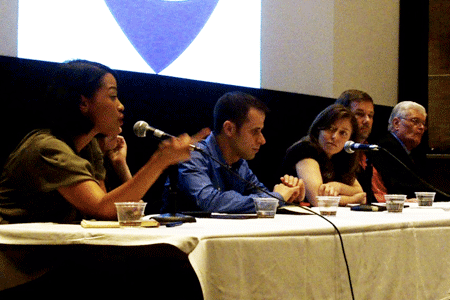Journalism alumni speak about careers
A panel of six accomplished Emerson alumni journalists spoke to students and faculty about adapting to the changing journalism industry recently in the Bill Bordy Theater. The panelists were from organizations such as The Boston Globe, WBUR, and The Boston Herald.
Steve Brown ’82, an anchor/host for NPR’s Boston affiliate station, WBUR, said he’s had to adapt to new technology throughout his career. “Imagine a world where there’s no Internet and no cell phones,” he said to the audience. “That’s the world I entered when I graduated from Emerson.” Brown explained that journalists must constantly “hang in” and keep up with the industry’s changes in technology and increased focus on multimedia and social media in order to be successful.
Robert Sands ’68 recalled his years as a young journalist, using a typewriter to write stories and trekking to the library to do research. The founder of 365Gay.com, the leading LGBT online news site on the web, Sands said the Internet has made things a lot easier, but it also puts pressure on reporters to do a lot more with a lot less time. Brown noted that instead of broadcasting a radio story and being done with it as he would have done in the past, he now has to “webify” the story by writing an online version and adding other content such as pictures or video.
Some of journalists’ extra responsibilities are due to news teams becoming smaller, the panelists said. Anaridis Rodriguez, MA ’11, is a reporter at Massachusetts TV station 22 News. She said one of the biggest surprises when she started her job was how much reporters are expected to do. Her time at Emerson helped her handle the pressure. “I do the work of four people. It’s a lot for anyone. But Emerson allowed me to be more confident and assertive and able to do this kind of multi-tasking,” she said.

Tania Mejer ’02 said she saw firsthand that Emerson is preparing Journalism students for the changing industry, through working with Emerson interns at The Boston Herald, where she works as a copyeditor. “Emerson interns came in and actually knew what to do to with things like video and how to tell a story with it in the face of older journalists. That enhanced a lot of our coverage and we often end up hiring interns because of this.”
Kailani Koenig-Muenster ’10 emphasized the importance of using connections to help find a job post-Emerson. A features producer for BostonGlobe.com, she was recommended for the position by one of her professors at Emerson. “Most of my friends are working through an internship, someone they knew at an internship, or someone their professor knows,” she said.
The panelists agreed that although the delivery system for journalism is changing, the basics stay the same. The fundamentals of good reporting still entail talking to the people others aren’t talking to and taking time your editor may not be allotting to you. “Sometimes you have to not do your job to do your job. Spend a little more time trying to find the story that the story could be,” Paul LaRocco ’02, a reporter for Newsday, said.
Emerson Associate Professor of Journalism Jerry Lanson moderated the panel, which was part of Emerson’s Communication Week 2012. After the event, he explained the importance of students hearing firsthand from alumni about how to get into and adapt to the newsroom. “There’s something special about hearing from successful alumni. [It gives students the affirmation that] I can do this too,” he said.
Categories